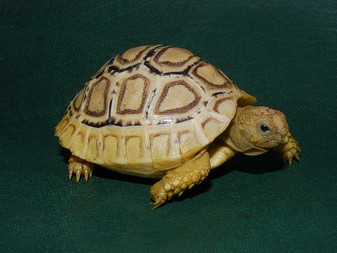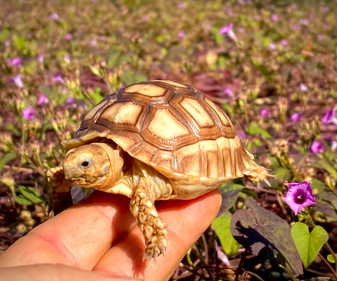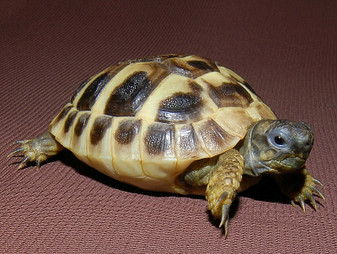Product Description
The South African Giant Leopard Tortoise, Pardalis pardalis is a rarely seen, very large growing sub species of the common Leopard Tortoise from the extreme southern portion of the Leopard Tortoise range into Namibia and South Africa. Thegiantof the Leopard Tortoises, reaching lengths of up to 33 inches, and weights over 100 pounds, South African Leopard Tortoises are easily distinguished by their tell tale spotting in the center of their carapace (upper shell) scutes. With only a few accomplished breeders able to successfully work with these impressive tortoises, the South African Leopard Tortoise is not often available - at any age/size... Their behavior and husbandry is identical to that for common Leopard Tortoises (Geochelone pardalis babcocki) and follows:
Leopard Tortoises originally came from the savannas of Southern and Eastern Africa. Their importation ended in 2000, so nearly all available animals are captive born here in the US. Breeders have become better at producing them in recent years, and once they are well started, they are great to keep and work with. Inside they do well on mulch or sand, and in tanks or enclosures with temperature ranges from 77 f to 87 f. A basking spot of 98 f is needed. They are fine outdoors in temperatures up to 95 f, so long as they have well shaded hiding spots; and are protected from predators. Night time lows should be above 78 f for juveniles and above 65 f for larger tortoises. Low humidity is best for Leopards as a rule, but younger tortoises do need more than adults. We soak younger Leopards every third day for about 10 minutes in warm, shallow water.
They do very well on Tortoise chow, mixed with veggies, and will endlessly graze on romaine lettuce, or grass. A calcium supplement is important to add to their diet.
Leopard Tortoises can grow to 20 inches, and live up to 50 years for their keepers. A few have made it to 26 inches, and 75 years. Dedicated keeping, along with a little luck, undoubtedly makes a difference. Beginning with a thriving tortoise is the key; and we only offer Leopards that are well established.
The USDA requires a veterinary health certificate for Leopard tortoises (and Sulcatta Tortoises) to be shipped from state to state. The Turtle Source is now pleased to provide these health certificates at no additional cost for out of state orders. Obtaining the health certificate may delay shipping by one day.









